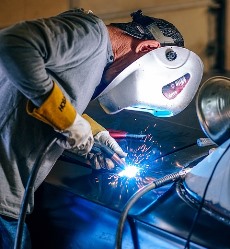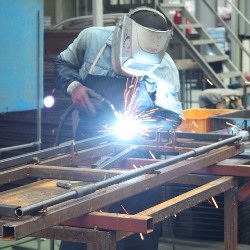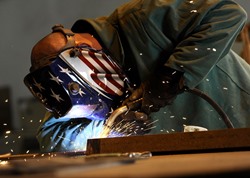How to Choose the Right Welding Training Program near Parma Idaho
 Finding the right welding technical school near Parma ID is an important first step to beginning your new career as a professional welder. But since there are so many schools to choose from, how do you know which ones to consider? And more notably, once you have narrowed down your options, how do you pick the best one? Most prospective students start by looking at the schools that are closest to their residences. Once they have located those that are within driving distance, they gravitate toward the least expensive one. Yes, location and the cost of tuition are important issues when evaluating welder trade schools, but they are not the only ones. Other considerations include such things as accreditation, reputation and job placement rates. So before initiating your search for a trade school to become a welder, it’s wise to establish a list of qualifications that your selected school must have. But before we examine our due diligence checklist, let’s cover a little bit about how to become a welder.
Finding the right welding technical school near Parma ID is an important first step to beginning your new career as a professional welder. But since there are so many schools to choose from, how do you know which ones to consider? And more notably, once you have narrowed down your options, how do you pick the best one? Most prospective students start by looking at the schools that are closest to their residences. Once they have located those that are within driving distance, they gravitate toward the least expensive one. Yes, location and the cost of tuition are important issues when evaluating welder trade schools, but they are not the only ones. Other considerations include such things as accreditation, reputation and job placement rates. So before initiating your search for a trade school to become a welder, it’s wise to establish a list of qualifications that your selected school must have. But before we examine our due diligence checklist, let’s cover a little bit about how to become a welder.
Welding Certificate and Degree Training
 There are several options available to get training as a welder in a trade or technical school. You can earn a a certificate, a diploma or an Associate Degree. Bachelor Degrees are available in Welding Engineering or Welding Technology, but are more advanced programs than most journeyman welders will need. Some programs are also made available combined with an apprenticeship program. Following are brief summaries of the most typical welding programs offered in the Parma ID.
There are several options available to get training as a welder in a trade or technical school. You can earn a a certificate, a diploma or an Associate Degree. Bachelor Degrees are available in Welding Engineering or Welding Technology, but are more advanced programs than most journeyman welders will need. Some programs are also made available combined with an apprenticeship program. Following are brief summaries of the most typical welding programs offered in the Parma ID.
- Diploma and Certificate Programs are usually made available by trade and technical schools and require about one year to complete. They are more hands-on training in scope, designed primarily to teach welding skills. They can provide a good foundation for a new journeyman or apprentice welder, or specialized skills for experienced welders.
- Associate Degree Programs will take 2 years to finish and are usually offered by community colleges. An Associate Degree in Welding Technology offers a more well-rounded education than the certificate or diploma while still supplying the foundation that readies students to enter the workforce.
Many states and municipalities do have licensing prerequisites for welders, so don’t forget to find out for your location of future employment. As needed, the welder school you select should prepare you for any licensing examinations that you will have to pass in addition to providing the appropriate training to become a qualified welder.
Welder Certification Options
 There are various organizations that provide welding certifications, which test the skill level and knowledge of those applying. A large number of Parma ID employers not only expect a certificate or degree from an accredited welding school, but also certification from a renowned agency like the American Welding Society (AWS). A wide range of certifications are available based on the kind of work that the welder does. Some of the skills that certification can attest to are the welder’s ability to
There are various organizations that provide welding certifications, which test the skill level and knowledge of those applying. A large number of Parma ID employers not only expect a certificate or degree from an accredited welding school, but also certification from a renowned agency like the American Welding Society (AWS). A wide range of certifications are available based on the kind of work that the welder does. Some of the skills that certification can attest to are the welder’s ability to
- Operate in compliance with specific codes
- Work with specific metal thicknesses
- Work with various types of welds
- Operate according to contract specifications
As already stated, various cities, states or local municipalities have licensing mandates for welders. Of those mandating licensing, many additionally require certification for different kinds of work. Certification is also a means to prove to employers that you are an extremely skilled and experienced welder. So just as with licensing, look into the requirements for your local area and make certain that the welder trade school you decide on prepares you for certification if needed.
What to Ask Welding Trade Schools
 When you have decided on the credential you would like to attain, a degree, certificate or diploma, you can start to evaluate schools. As you can imagine, there are many welder trade and vocational schools in the Parma ID area. That’s why it’s important to establish in advance what qualifications your chosen school must have. We have already discussed 2 important ones that many people consider first, which are location and tuition cost. As stated, although they are essential qualifications, they are not the only ones that must be considered. After all, the school you choose is going to furnish the instruction that will be the foundation of your new vocation as a welder. So following are more factors you might need to consider before picking a welding vocational school.
When you have decided on the credential you would like to attain, a degree, certificate or diploma, you can start to evaluate schools. As you can imagine, there are many welder trade and vocational schools in the Parma ID area. That’s why it’s important to establish in advance what qualifications your chosen school must have. We have already discussed 2 important ones that many people consider first, which are location and tuition cost. As stated, although they are essential qualifications, they are not the only ones that must be considered. After all, the school you choose is going to furnish the instruction that will be the foundation of your new vocation as a welder. So following are more factors you might need to consider before picking a welding vocational school.
Accreditation. It’s very important that the welding tech school you choose is accredited by either a regional or a national organization. There are two standard types of accreditation. The school may attain Institutional Accreditation based on all of their programs. Programmatic Accreditation is based on an individual program the school offers, such as Welding Technology. So make certain that the program you select is accredited, not just the school itself. Also, the accreditation should be by a U.S. Department of Education acknowledged accrediting organization, such as the Accrediting Commission of Career Schools and Colleges of Technology (ACCSCT). Besides helping ensure that you get an excellent education, the accreditation may also help in securing financial aid or student loans, which are often not available in Parma ID for schools that are not accredited. Also, for those states or local governments that mandate licensing, they may require that the welding training program be accredited also.
Job Assistance and Apprenticeship Programs. Many welder diploma or degree programs are offered in conjunction with an apprenticeship program. Various other schools will help place you in a job or an apprenticeship upon graduation. Find out if the schools you are reviewing assist in placing students in apprenticeships or have a job assistance program. The schools should have relationships with local unions and various metal working businesses to which they can place their students. Older schools may have a more substantial network of graduates that they can rely upon for referrals. These programs can help students find employment and establish relationships within the Parma ID welding community.
Job Placement and Completion Rates. The completion rate is the percentage of students that enroll in an educational program and finish it. It’s essential that the welder program you select has a higher completion rate. A reduced rate could indicate that the students who enrolled in the program were dissatisfied with the training, the instructors, or the facilities, and quit. The job placement rate is also a good indicator of the caliber of training. A high job placement rate will not only confirm that the program has a good reputation within the trade, but additionally that it has the network of Parma ID contacts to assist students obtain apprenticeships or employment upon graduation.
Up-to-date Equipment and Facilities. After you have limited your selection of welding schools to two or three options, you should think out going to the campuses to inspect their facilities. Confirm that both the equipment and the facilities that you will be trained on are modern. In particular, the training equipment should be comparable to what you will be working with in the field. If you are uncertain what to look for, and are already in an apprenticeship program, consult with the master welder you are working under for guidance. If not, ask a local Parma ID welding contractor if they can give you some pointers.
School Location. Even though we previously briefly talked about the significance of location, there are a couple of additional issues that we should address. You should bear in mind that unless you can move, the welder school you choose needs to be within driving distance of your Parma ID home. If you do choose to attend an out-of-state school, besides relocation costs there might be higher tuition fees for out-of-state residents. This is especially the case for welding degree programs offered by community colleges. Additionally, if the school offers an apprenticeship or job placement program, often their placements are within the school’s regional community. So the location of the school should be in an area or state where you ultimately will desire to work.
Smaller Classes. Personalized instruction is important for a hands-on trade such as welding. It’s possible to get lost in bigger classes and not get much one-on-one training. Ask what the average class size is for the welder schools you are considering. Inquire if you can attend a couple of classes so that you can observe just how much personal attention the students are receiving. While there, talk with a few of the students and get their feedback. Similarly, chat with a few of the trainers and ask what their welding experience has been and what certifications and credentials they hold.
Flexible Class Scheduling. Lots of folks learn a new profession while still working at their present job. Verify that the class schedules for the programs you are reviewing are flexible enough to meet your needs. If you can only go to classes in the evenings or on weekends near Parma ID, make certain that the schools you are looking at provide those choices. If you can only attend part-time, make sure that the school you pick offers part-time enrollment. Also, ask what the protocol is to make up classes should you miss any due to illness, work or family circumstances.
Online Welder Schools
 Welding is truly a hands-on type of trade, and consequently not very suitable for training online. However, there are a few online welding programs offered by specific community colleges and trade schools in the greater Parma ID area that may count toward a degree or certificate program. These courses primarily cover such topics as reading blueprints, safety,, and metallurgy. They can help give a beginner a foundation to begin their education and training. Nevertheless, the most significant point is that you can’t learn how to weld or use welding materials unless you actually do it. Clearly that can’t be done online. These skills must be learned in an on-campus setting or in an apprenticeship. Online or distance learning is better suited for experienced welders that would like to advance their expertise or perhaps earn a more advanced degree. So if you should come across an online welding certificate or degree program, be extremely careful and confirm that the bulk of the training is done on campus or in a workshop type of setting.
Welding is truly a hands-on type of trade, and consequently not very suitable for training online. However, there are a few online welding programs offered by specific community colleges and trade schools in the greater Parma ID area that may count toward a degree or certificate program. These courses primarily cover such topics as reading blueprints, safety,, and metallurgy. They can help give a beginner a foundation to begin their education and training. Nevertheless, the most significant point is that you can’t learn how to weld or use welding materials unless you actually do it. Clearly that can’t be done online. These skills must be learned in an on-campus setting or in an apprenticeship. Online or distance learning is better suited for experienced welders that would like to advance their expertise or perhaps earn a more advanced degree. So if you should come across an online welding certificate or degree program, be extremely careful and confirm that the bulk of the training is done on campus or in a workshop type of setting.
Attending a Welding School in Parma ID?
If you have decided to enroll in a welder training program in the Parma Idaho area, you may find the following information both informative and helpful about the location of your new school campus.
Parma, Idaho
Parma is a city in Canyon County, Idaho, United States. The population was 1,983 at the 2010 census, up from 1,771 in 2000. It is the fourth largest city in the county (behind Middleton, Caldwell, and Nampa all in the county’s eastern portion) and the largest in the rural western portion. It is part of the Boise City–Nampa, Idaho Metropolitan Statistical Area.
As of the census[2] of 2010, there were 1,983 people, 710 households, and 506 families residing in the city. The population density was 1,802.7 inhabitants per square mile (696.0/km2). There were 779 housing units at an average density of 708.2 per square mile (273.4/km2). The racial makeup of the city was 75.4% White, 0.4% African American, 1.2% Native American, 0.7% Asian, 20.0% from other races, and 2.4% from two or more races. Hispanic or Latino of any race were 31.0% of the population.
There were 710 households of which 37.3% had children under the age of 18 living with them, 51.7% were married couples living together, 13.5% had a female householder with no husband present, 6.1% had a male householder with no wife present, and 28.7% were non-families. 24.6% of all households were made up of individuals and 10.2% had someone living alone who was 65 years of age or older. The average household size was 2.77 and the average family size was 3.31.
Select the Right Welding Technical School Parma ID
Selecting the right welder training program will probably be the most critical decision you will make to begin your new trade. You originally stopped by our website because you had an interest in Learn MIG Welding. However, as we have covered in this article, there are a number of things that you will need to evaluate and compare between the schools you are reviewing. It’s a necessity that any welding training that you are evaluating includes a considerable amount of hands-on instruction. Classes should be small in size and every student should have their personal welding machine to train with. Classroom instruction should provide a real-world context, and the training program should be current and in-line with industry standards. Courses vary in length and the type of credential offered, so you will need to ascertain what length of program and degree or certificate will best serve your needs. Each program offers different options for certification also. Perhaps the best approach to research your final list of schools is to go to each campus and talk with the faculty and students. Invest some time to monitor a few classes. Tour the campus and facilities. Make certain that you are confident that the program you select is the ideal one for you. With the right training, effort and dedication, the final result will be a new occupation as a professional welder in Parma ID.

